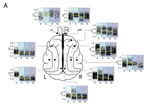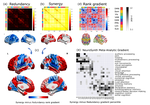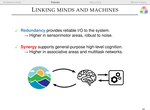Information theory in neuroscience
Throughout the history of natural philosophy, thinkers have turned to the technology of their times to explain the brain. Two thousand years ago the brain of an infant was (almost literally) thought to be a tabula rasa – a blank slate. As the centuries passed, the brain was treated as a system of hydraulic valves, then as the workings of an “electric fluid.” And now, we study the brain as we study information in a computer network.
In this spirit, part of my research covers how the of study information processing in the brain, both mathematically and experimentally, and the advantages it offers over and above alternative approaches. At the same time, I also acknowledge the information metaphor isn’t perfect, and try to explore the explore the limits of when it is, and when it isn’t, appropriate.
More specifically, I place great emphasis on methodological advancements, and use information theory to undertake a theoretically- and empirically-informed revision of our tools to measure consciousness and cognition. Overall, my research is guided by three questions:






